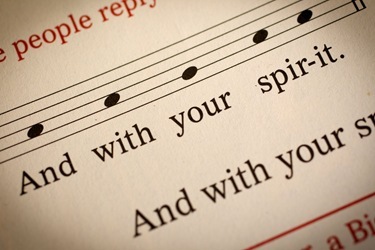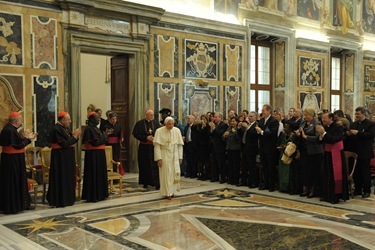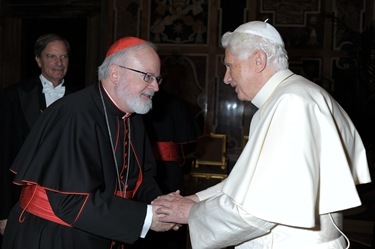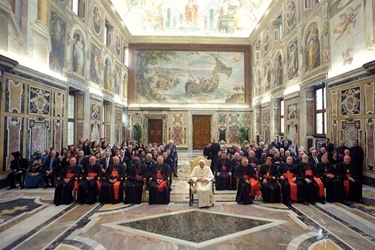Hello and welcome!
I hope you all had a pleasant and relaxing Thanksgiving. Thanksgiving is always a special time for families to come together around the table and give thanks to the Lord for all the blessings he has bestowed upon us during the year. I myself, was able to be together with two of my cousins, and their families for Thanksgiving. I am very grateful for that.
– – –
Of course this past weekend we marked the start of Advent, and English speaking Catholics in the United States began to celebrate the Mass according to a new translation of the Roman Missal.

Clergy and lay people throughout the Archdiocese have been coming together to prepare for this implementation over the past two years, and I’m glad to hear that all the preparation and catechesis really has paid off! I’ve been hearing very encouraging reports from pastors, and my own experience of celebrating Mass according to the new translation this past week has been very positive. The new words are rich in meaning and I find that there’s a real elegance to the new style of our prayers. I am particularly struck by how many of the new prayers come to us right out of the Sacred Scriptures.
I know that this change has been difficult for some people, and for all of us it will take some time to adjust to the new responses at Mass. As a priest, it’s as though I’m celebrating Mass for the first time — really having to pay attention to the words that are printed in the Missal. I’m sure that with time we will all be much more comfortable with these beautiful prayers, and we won’t rely so heavily on the printed text in front of us. But for now, I find myself looking down and reading from the book most of the time!
I really do hope and pray that these new prayers will help us to pray better, and to discover again the meaning of what we do when we gather around the altar to celebrate the great gift that the Lord has left for us.
I am so grateful to the priests and lay people who devoted so much energy over the past few years to help prepare us all for the Missal, and I am most grateful to the pastors and parish staffs who did a great job preparing their congregations for these changes. Keep up the good work!
– – –
As some of you may know, one of my responsibilities to the Universal Church as a cardinal is to serve at various dicasteries in the Holy See. I am currently on three commissions, and this week I have been in Rome for meetings with The Pontifical Council for the Family. This year we are celebrating the 30th anniversary of the apostolic exhortation Familiaris Consortio that was published in 1981 by Blessed John Paul II, the same year he created the Council for the Family.

A number of cardinals serve with me on the council — including Cardinal George Pell of Sydney, Cardinal Norberto Rivera of Mexico City, and Cardinal Edward Eagan, the former Archbishop of New York — as well as a number of bishops and archbishops. The president is the Cardinal Ennio Antonelli, who was the Archbishop of Florence.

However, unlike most dicasteries, the Council has a large number of lay members — including 19 married couples from all over the world. Among them are Supreme Knight Carl Anderson and his wife Dorian; Michael Waldstein of Ave Maria University and his wife Susan; and John Grabowski of The Catholic University of America and his wife Claire. Timothy O’Donnell, the president of Christendom College, is also a consultor to the Council. Of course, there also were people from Germany, Spain, the Philippines, and different countries in Africa, South America, and Central America.
In this year’s program we heard reports on the situation of marriage and family throughout the world. There were some excellent presentations and discussions on the situation of family life, and the ministry and the challenges of the Church trying to promote family life as part of the Church’s mission.
The Rome Reports TV news agency had a very nice report on our meeting. It features some nice remarks by Dr. O’Donnell.
– – –
I was happy to be the principal celebrant of one of the Masses for the plenary session. I celebrated the Mass on the Feast of St. Andrew. I would like to share that homily with you:
Last February, it was my privilege to celebrate Mass at a Chapel built over the house where the apostles Peter and Andrew lived. It is very near the ruins of the ancient synagogue in Capharnaum where Jesus gives us the powerful Eucharistic discourse on the Bread of Life. Today we celebrate the feast of Andrew, the brother of Peter and apostle of our Lord. The New Testament does not provide us with many details of his biography. We know that he was born in Bethsaida near the Sea of Galilee. He was a disciple of John the Baptist and was present when the Baptist proclaimed: “behold the Lamb of God”.
The tradition is that Andrew, the apostle, founded the See of Byzantium that was later to be called Constantinople. Blessed John Paul II, who was endowed with such a genius for symbolism, instituted a very beautiful practice on today’s feast day. Because St. Peter is the special patron of Rome and his brother Andrew is the patron of Constantinople, John Paul II made use of their feast days for a very touching ecumenical exchange with the Patriarch of Constantinople. Accordingly, the pope sends a representative to a special celebration of the feast of St. Andrew at the Phanar, the headquarters of the patriarch, and likewise, always receives a representative of the patriarch for the celebration of St. Peter on June 29 in Rome. It is a practice that we have tried to observe in Boston. In fact, if I were not with you this morning here in Rome, I would have gone to the Greek Orthodox Cathedral in Boston. Likewise, Metropolitan Methodius always comes to the Catholic Church for the celebration of the feast of St. Peter. We pray for the day when our two churches will be reunited as they were for the first thousand years of Christianity. May the intercession of the brothers, Peter and Andrew, speed us on the path of unity.
Today’s gospel reminds us that Andrew and his brother Peter were fishermen. They were lousy fishermen. It seemed they never caught anything unless Jesus was there telling them throw the net here, do it now. Jesus invites them: “follow me and I will make you fishers of men”. Andrew and Peter left their boats and nets and family, they left everything and followed Jesus. Their vocations helped change the course of history. In the same Gospels we just heard, Jesus calls two other brothers, James and John the sons of Zebedee. They too leave everything to follow Jesus.
Jesus is still calling brothers and whole families to lead lives of discipleship and to participate in His mission. We are in Rome this week to mark the 30th anniversary of Familiaris Consortio and the creation of the Pontifical Council for the Family. In Familiaris Consortio, Pope John Paul II writes: “the family finds in the plan of God the Creator and Redeemer, not only its identity, what it is, but also its mission, what it can and should do. The role that God calls the family to perform in history derives from what the family is. Each family finds within itself a summons that cannot be ignored, and that specifies both its dignity and responsibility; family, become what you are.”
Our task is to be evangelizers like the great apostle Andrew. When Andrew discovers the Messiah, thanks to the witness of John the Baptist who declares, “behold the Lamb of God”, Andrew immediately goes to share that good news with his brother Peter. When we come to discover, through the many witnesses who surround us, that Jesus Christ is our Savior and our brother, like Andrew, we must share that good news with others. Jesus wants us to be fishers of men, and too often we are content to be keepers of the aquarium. In today’s first lesson we listen to the stirring words of Paul: “for everyone who calls on the name of the Lord will be saved.” But how can they call upon him in whom they have not believed? And how can they believe in him of whom they have not heard? How beautiful are the feet of those who bring the good news. Ours must be the beautiful feet that tirelessly carry the joyful news of the gospel to the families of today who are burdened by so many obstacles and challenges. The mission that Christ has entrusted to us is crucial for the future of our Church, and indeed for the future of human society. In many poor countries, families often lack the means necessary for survival such as food, work, decent housing, and medical care. Ironically enough, in the wealthier countries of the West, excessive prosperity and the consumer mentality sometimes deprive married couples of the generosity and courage needed for raising up new life. Consequently life is often perceived, not as a blessing, but as a danger from which to defend oneself.
The liberating message of Christ that Andrew carried to Byzantium, Georgia and Russia is the message that we must carry to our contemporaries. Some are not anxious to hear what we have to say. But Andrew did not always find an enthusiastic audience. We are told that he was crucified on a cross shaped like a huge letter X. The world needs witnesses, martyrs, whose suffering invite people to believe.
In our contemporary world the autonomous self, the highly individualistic and alienated modern man, is often disconnected from God and from community. The autonomous self is part of the lonely crowd that contrasts with real community. We see this in a symbolic way in many of the gospel stories when the crowd is pushing people away from Christ as in the case of Zacchaeus the tax collector, who is “vertically challenged” and obliged to climb the sycamore tree to glimpse Jesus. The crowd pushes him away as it pushed away Bartimeus, the blind beggar. The crowd of individuals keeps people away from Christ, whereas the community is always reaching out, drawing people closer to the Lord. Our Church must not be a crowd of individuals but rather a family, a community that draws people ever closer to the loving presence of Christ. We live out our own mission as Christ’s family only by inviting others to be a part of that mission and by helping families “become what they are.”
In God’s plan families are missionary. They pass on the faith to new generations and share the treasures and legacies that they have received with their new members. Marriage, in God’s plan, is a sanctuary of life and the family, a community of love. That is a very important part of the gospel message, of the good news that we must live and proclaim. As Pope Paul VI said: “the family, like the Church, ought to be a place where the gospel is transmitted and from which the gospel radiates. In a family which is conscious of this mission, all the members evangelize and are evangelized. The parents not only communicate the gospel to their children, but from their children, they can themselves receive the same gospel as deeply lived by them. And such a family becomes an evangelizer of many other families.”
We are all privileged to have known such families as described by Pope Paul VI. One such family that made a profound impression upon me as a young seminarian was the Gauchat family. Bill and Dorothy were dear friends of Dorothy Day and Peter Maurin of the Catholic Worker Movement. The Gauchats had six children of their own but they took in dozens of severely handicapped children whose parents were unable or unwilling to care for them on their farm in Avon, Ohio. Bill and Dorothy taught their own children how to love and care for these needy children who became their brothers and sisters. It was truly a labor of love. I will never forget the impact it made on me the first time I visited their home and saw those terribly deformed children receiving so much love in that family.
Being a family in God’s family is to be a community of love where people learn to make a gift of themselves to God and to others. Those beautiful families change the course of history. They open the door that allows God’s light to enter our world. May Andrew and Peter and James and John and all the holy families that have gone before us in the Church, help us to inspire new generations of Catholic families in the spirit of Nazareth: communities of love and prayer, of joy and loving service, imbued with the mission of building a civilization of love and announcing that the Kingdom of God is at hand.
– – –
On Thursday, we had an audience with the Holy Father in the Sala Clementina, and he made an address to us.

I would have liked to share with you the full text of his remarks in English (the Holy Father addressed us in Italian), but a translation is not yet available on the Vatican web site. However, as it usually does, the Vatican Information Service had a nice summary of the pope’s remarks:
VATICAN CITY, 1 DEC 2011 (VIS) – The Holy Father today received participants in the plenary assembly of the Pontifical Council for the Family led by their president, Cardinal Ennio Antonelli. This year’s plenary coincides with the thirtieth anniversary of John Paul II’s Apostolic Exhortation "Familiaris consortio" and his creation of the pontifical council itself.

In his remarks, the Pope noted that "in our time, as in the past, the eclipse of God, the spread of an anti-family ideology and the abasement of sexual morality appear interconnected". This is why "the new evangelization is inseparable from the Christian family. The family is the Church’s ‘path’, because it is a ‘human place’ in which we encounter Christ. … The family founded on the Sacrament of Marriage is an individual microcosm of the Church, a community which is saved and saves, which is evangelised and evangelises. Like the Church, the family is called to live, irradiate and express to the world the love and presence of Christ".

Accepting and transmitting divine love, Benedict XVI explained, "comes about in the spouses’ dedication to one another, in generous and responsible procreation, in raising and educating children, in work and social relations, in care for the needy, participation in Church activity and commitment to civil society". The Christian family "reflects the splendour of Christ and the beauty of the divine Trinity in the world" in the extent to which it manages to experience love "as communion and service, as reciprocal gift and openness to everyone".
The Pope then recalled his recent visit to Ancona to close the Italian National Eucharistic Congress where he had met priests and married couples together. "Both these states of life", he said, "have the same roots in Christ’s love whereby He gave Himself for the salvation of humanity; they are called to a shared mission of bearing witness to this love, and causing it to be present through service to the community for the edification of the people of God. Such a perspective enables us to overcome a reductive vision in which the family is seen as the mere recipient of pastoral activity. … The family is the best place to impart human and Christian education, and thus remains the greatest ally of priestly ministry".

The Pope then identified a number of areas in which the cooperation of priests and Christian families is vital: educating children, adolescents and young people in love, seen as communion and the gift of self; preparing engaged couples for marriage; forming spouses; participating in charitable, educational and civil activities, and in pastoral care by families for families.
Finally, referring to the forthcoming seventh World Meeting of Families, due to be held in Milan, Italy, in June 2012, the Pope said: "It will be a great joy for me and for us all to come together, pray and rejoice with families from all over the world".
Until next week,
Cardinal Seán
